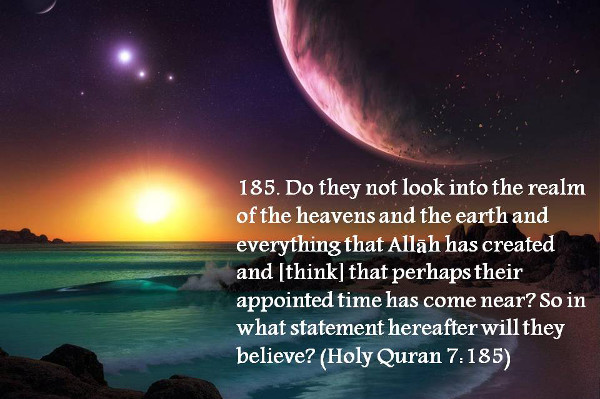

By: Dr. Daud Batchelor
Source: Muslimvillage
For our enlightenment and progress, the Ummah today needs to regain the spirit of wonder of the early Muslims whose faith in God soared under inspiration from the Qur’anic revelations and tutelage of Prophet Muhammad (Peace be upon him). With these, Muslims could appreciate God’s mercy and benevolence in creating the universe with man in the august role as khalifah (vicegerent) and custodian of the earth, according to the inspiring verse (45:13): “He has subjected to you, as from Him, all that is in the heavens and on earth.”
The imagination of a Muslim scientist reading the Qur’an would naturally be stirred by verses where Allah avers to natural phenomena, encouraging mankind to investigate more deeply. Islam as a science-friendly religion promotes scientific investigation and technological advancement. Mohammad Iqbal wrote in his book, The Reconstruction of Religious Thought in Islam, that for a long time Muslim scholarship remained under the influence of Hellenistic thought that was theory-oriented. The Qur’an however, eventually changed that and in this sense Iqbal characterised the Qur’an as ‘anticlassical’ in its strong focus on experimental and deductive reasoning. This is great encouragement for Muslims to seek practical beneficial knowledge.
‘Science’ is used in this article in the context of the natural sciences. However, in contrast to its accustomed secular usage in the West, a Muslim scientist inspired by the Qur’an would maintain a connection of science with spirituality. The Qur’an itself uses the term ‘ilm, or knowledge in the broadest sense; not separating knowledge of the manifested world from the world of the unseen.
God Almighty provides humanity with two books – kitab at-tadwini (written revelation) and kitab at-takwini (book of natural phenomena to be deciphered ontologically). Obviously, understanding from these two books from the same Source should be in agreement. If they appear not so then scientists need to revisit their theories since Muslims believe the Qur’an is without flaws. Muslim scientists have a great advantage in that the Qur’an is believed to be pristine – extant in the original language of revelation. So the Qur’anic verses on natural phenomena can yield true insights. The challenge however, is in interpreting meaning(s) of the verses correctly.
Scholars believe that the Qur’an contains references to all essential themes but does not go into details. It is not a science textbook. It however provides scientific insights in more than 750 verses on natural phenomena.
Informed tafsir (exegesis) of the Qur’an depends traditionally on four sources: the Qur’an explicating other verses, the Sunnah, Arabic language, and the Prophet’s Companions. These should also be investigated regarding scientific exegesis of the Qur’an, called Tafsir ‘Ilmiy. A number of classical scholars applied a similar approach, including al-Jahiz (776-869) and Ibn Hazim (994-1064). The great classical Qur’an commentator, Fakhruddin Ar-Razi (1149-1209) was a pioneer using contemporary knowledge of science in his major work, Mafatib al-ghayb (The Keys to the Unknown). From Allah’s title, rabbil ‘aalameen (Lord of the worlds), in Al-Fatihah, the opening chapter of Al-Qur’an, he proposed that many ‘universes’ existed rather than the one known then – the Milky Way galaxy. Only much later other galaxies were confirmed by Edwin Hubble using powerful telescopes.
Arguably, among the most impressive verses, scientifically considered, are those describing development of the human foetus in the womb (32:8-9): “Then He fashioned him in due proportion, and breathed into him of His spirit. And He gave you (the faculties) of hearing and sight and feeling (heart)”. These clearly prefigure more recent gynaecological findings of the true sequence of organ appearance in the developing foetus – first ears, then eyes, and finally heart.
It is imperative though that scientists avoid errors that may result from being too adamant on adopting one Qur’anic meaning over other alternatives. An Iraqi researcher Fadhel al-Sa’d argued on television that the earth is flat, due to his faulty reading of verse 57:21. His view is easily disproved by observations from spacecraft.
The Muslim world would seem to be on the doorstep of important advances in Qur’anic-inspired scientific understanding. To enhance such development, the scientific fraternity needs support from government and industry and increased research funding. Further, close collaboration between the scholars of revelation (the ‘Ulama) and the scholars of natural phenomena (‘scientists’), particularly by promoting development of those capable of crossing boundaries and encompassing both tadwimi and takwini perspectives in the pattern of the early Muslim universal scholars, can recapture the initiative for a new Islamic enlightenment of religious-inspired scientific understanding.



